| Srl | Item |
| 1 |
ID:
187484
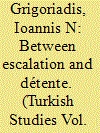

|
|
|
|
|
| Summary/Abstract |
This paper aims to evaluate the state of Greek-Turkish relations in light of recent developments in the reconfiguration of Turkish foreign policy. Following twenty years of détente and relative calm in bilateral relations, the year 2020 witnessed two escalations in Greek-Turkish relations, one in March involving refugees and immigrants on the Greek-Turkish land border and another in August involving military vessels of the two countries. The refugee crisis and potential military conflict regarding energy exploration in the Eastern Mediterranean have raised tensions at a moment the political and institutional tools for the promotion of conflict resolution between Greece and Turkey linked to Turkey’s EU membership perspective appear to be obsolete. This paper seeks an answer to the question of whether structural or ideational factors played the most prominent role in the recent escalation of the Greek-Turkish disputes.
|
|
|
|
|
|
|
|
|
|
|
|
|
|
|
|
| 2 |
ID:
187482
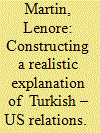

|
|
|
|
|
| Summary/Abstract |
U.S. support for the Syrian-Kurdish forces aligned with the PKK; U.S. declining to extradite Fethullah Gülen; Turkey’s purchase of the Russian S-400 missile defense system; and Turkey’s aggressive interference with natural gas exploration in the Mediterranean are four issues that have roiled U.S.-Turkish relations. This paper examines neorealist and constructivist explanations for these issues and determines that they provide a less than complete understanding of this troubled relationship. The paper then turns to middle level alliance theory and domestic factors favored by neoclassical realism to fill in the explanatory gaps.
|
|
|
|
|
|
|
|
|
|
|
|
|
|
|
|
| 3 |
ID:
187476
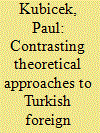

|
|
|
|
|
| Summary/Abstract |
This article introduces a Special Issue dedicated to applying international relations theories to Turkish foreign policy. More specifically, it contrasts structural or neo-realist approaches with ideational or constructivist ones, suggests general strengths and shortcomings in each, and briefly suggests how both might apply to TFP. It also introduces the eight substantive articles in the Special Issue.
|
|
|
|
|
|
|
|
|
|
|
|
|
|
|
|
| 4 |
ID:
187480
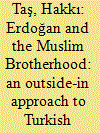

|
|
|
|
|
| Summary/Abstract |
Amidst multiple foreign policy flip-flops of the Turkish government, the Middle East is where observers agree most about the explanatory priority of ideational factors over realpolitik calculations. The assertive foreign policy activism to extend the country’s role in the region has largely been linked to the Islamist leanings of the ruling Justice and Development Party (AKP). This study revisits Turkey’s Middle East policy with a particular focus on the AKP’s relations with the Muslim Brotherhood (Ikhwan al Muslimin), which marked Turkish foreign policy formulation and implementation in multiple theatres from Yemen to Egypt to Libya. Using a neoclassical realist approach, it argues that the AKP’s ideological ties to the Ikhwan are significant for the availability of new resources but Turkish foreign policy behavior in the Middle East, including relations with the Ikhwan, reflects a grand strategy to respond to systemic and sub-systemic stimuli.
|
|
|
|
|
|
|
|
|
|
|
|
|
|
|
|
| 5 |
ID:
187481
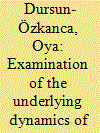

|
|
|
|
|
| Summary/Abstract |
This article analyzes contemporary Turkey-European Union (EU) relations through the lenses of international relations (IR) theory. After providing a brief overview of the history of Turkey-EU relations, it focuses on the underlying dynamics of Turkey-EU relations in the post-2016 period. It makes a case that realism is better suited to explain the latest episodes in Turkey-EU relations. It specifically argues that balancing and neoclassical realism provide a more nuanced explanatory value as to why Turkey and the EU are going through a particularly tense period in their relationship. It also outlines global/regional factors as well as intervening national/domestic factors behind the rising tensions in Turkey’s relations with the EU.
|
|
|
|
|
|
|
|
|
|
|
|
|
|
|
|
| 6 |
ID:
187477
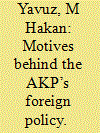

|
|
|
|
|
| Summary/Abstract |
This paper examines the role of ideas and identities in the making of the AKP’s foreign policy in Turkey. After briefly examining the institutional and international constraints on Turkish foreign policy before 2002, the discussion turns to the driving factors in three evolutionary stages of AKP’s foreign policy. It becomes apparent that a neo-Ottoman worldview and accompanying identity constitute the interpretive framework of the AKP’s political elite. The article traces how this worldview became dominant in Turkey’s policy making after the government dismantled the country’s Kemalist institutions and the AKP consolidated its political power.
|
|
|
|
|
|
|
|
|
|
|
|
|
|
|
|
| 7 |
ID:
187478


|
|
|
|
|
| Summary/Abstract |
This article explores how notions of conservative populism animate Turkish foreign policy. It explicates the construction of the ‘us’ and ‘them’ in conservative populism and how it became the dominant or hegemonic discourse of the AKP regime. While demonstrating various aspects of the peculiar conservative populism, the paper will try to point out the specific governmental ethos that conservative populism generates in the case of the AKP. By emphasizing how conservative populism is intermingled with Turkish-Islamist ideology, the paper explores the background of the AKP’s pro-active and assertive foreign policy as well as the devastating effects of the de-institutionalization of the bureaucratic state structure and decision-making mechanisms.
|
|
|
|
|
|
|
|
|
|
|
|
|
|
|
|
| 8 |
ID:
187483
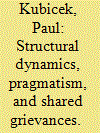

|
|
|
|
|
| Summary/Abstract |
In recent years, closer Turkish-Russian relations have captured the attention of both academics and policymakers, but also seem rather paradoxical as the two countries find themselves on opposite sides of conflicts in Syria, Libya, and the Caucuses. This paper evaluates how effective neo-realist (structural) and ideational (constructivist) theories of international relations are in explaining the Turkish-Russian relationship. Ultimately, this paper finds more merit in accounts grounded in neo-realism that can capture aspects of both cooperation and conflict/competition in the relationship.
|
|
|
|
|
|
|
|
|
|
|
|
|
|
|
|
| 9 |
ID:
187479


|
|
|
|
|
| Summary/Abstract |
The article builds on current academic debates pertaining to the use of religion in global politics. By examining how and why religion is used as a tool for foreign policy aims as well as for perpetuating a state’s identity and institutional capacity at home and abroad; the article presents a theory-informed discussion on Turkey’s transnational politics of religion from a comparative perspective. The country’s use of religion as a political tool outside of its borders has been studied in Western Europe, Africa, Asia and the Balkans thanks to extensive fieldwork and interviews conducted between 2016 and 2020. The article investigates how and why Turkey has implemented similar policies with different aims in different geographic territories and the underlying material and normative motivations for this pursuit. The main argument presented in the article is that Turkey, under the rule of the AKP (Justice and Development Party), employs religion for three fundamental reasons: to bolster its regional and global influence, to access regions or groups that are difficult to reach through traditional foreign policy tools and to alter domestic political balances or amass power.
|
|
|
|
|
|
|
|
|
|
|
|
|
|
|
|